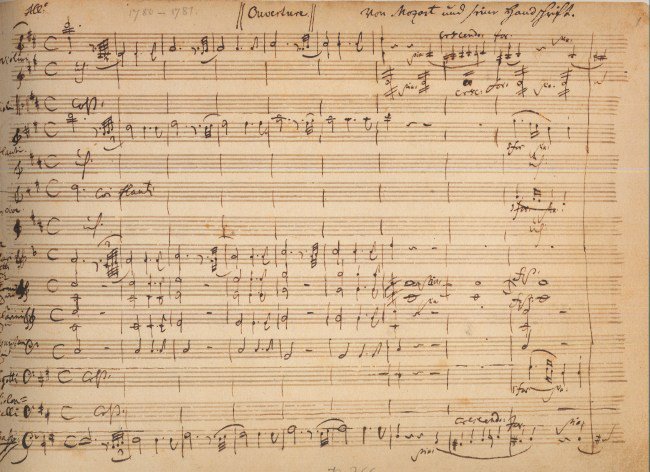Opera seria (drama per musica, text by Giambattista Varesco). Composed on commission for the Munich court, Idomeneo was first performed on 29 January 1781 as the principal production of the 1780-1781 carnival season. The composer’s autograph survives partly at the Staatsbibliothek zu Berlin (act 3) and partly at the Biblioteca Jagiellónska, Kraków (acts 1 and 2).
The opera was well-received – Mozart wrote to his father that at one of the rehearsals, Karl Theodor, Elector of Bavaria, said to him, ‘Who could believe that such great things could be hidden in so small a head?’ – and was performed three times, on 29 January and 5 and 12 February. Mozart gave a performance of the opera in Vienna on 13 March 1786 at the private theatre of Prince Karl Auersperg, for which he rewrote the role of Idamante, originally sung by a soprano, for tenor, and replaced two numbers (‘S’io non moro a questi accenti’ and the opening of act 2) with the newly-composed duet ‘Spiegarti non poss’io’ K489, and the scena ‘Non più, ascoltai—Non temer, amato bene’ K490, respectively.

W. A. Mozart, Idomeneo, Overture (autograph, Kraków, Biblioteca)
A rich correspondence between Mozart and his father from late 1780 and early 1781 documents the composer’s work on the opera. One letter, dated 8 November 1780, relates in particular to ‘Se il padre perdei’, which Mozart performed at his Burgtheater concert of 23 March 1783:
- I’ve a request to make of the Abbate [Varesco, the librettist]; – Ilia’s aria in the second scene of act two I’d like to change a little to bring it into line with what I need – se il padre perdei in te lo ritrovo: this line couldn’t be better – but then comes something that has always struck me as unnatural – I mean in an aria – namely, an aside. In a dialogue these things are entirely natural – a few words are hurriedly spoken as an aside – but in an aria, where the words have to be repeated, it creates a bad impression – and even if this weren’t the case, I’d still prefer an aria here – if he’s happy with it, the opening can stay as it is, as it’s delightful – an aria that flows along in an entirely natural way – where I’m not so tied to the words but can just continue to let the music flow, as we’ve agreed to include an andantino aria here with 4 concertante wind instruments, namely, flute, oboe, horn and bassoon.
- Category/Role
- Opera
- Author/Creator
- Mozart, Wolfgang Amadeus
- Date 1
- 1780 (composition)
- Date 2
- 1781-01-29 (first performance)
- Location
- Munich
- Sub-location
- Court theatre, Munich